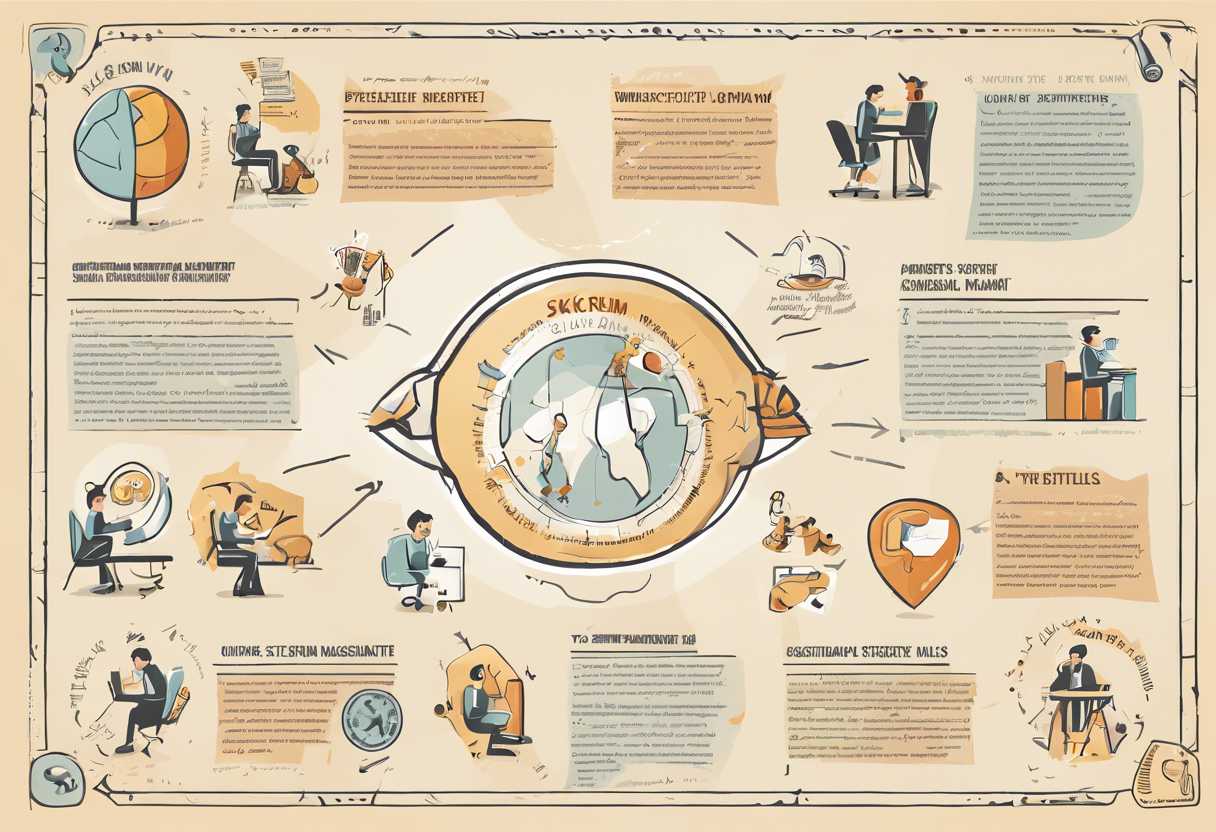Are you curious about the role of a Scrum Master in Agile project management? Wondering what qualities and skills make an effective Scrum Master, or what responsibilities and duties they have? Perhaps you’re interested in learning about the importance of a Scrum Master in team collaboration and productivity, or how to become a certified Scrum Master and advance your career. In this blog post, we’ll explore all these aspects and more, providing you with a comprehensive understanding of what it means to be a Scrum Master. Whether you’re new to the concept or looking to deepen your knowledge, this post will cover everything you need to know about the role of a Scrum Master. So, let’s dive in and explore the world of Scrum Masters together.
The Role of a Scrum Master in Agile Project Management
Understanding the Scrum Master’s Responsibilities
The Scrum Master plays a crucial role in Agile project management, acting as a facilitator for the Scrum team. Their primary responsibility is to ensure that the team adheres to the Agile principles and practices, and to remove any obstacles that may hinder the team’s progress. This involves coaching the team on self-organization, cross-functionality, and continuous improvement, as well as facilitating the various Scrum events such as sprint planning, daily stand-ups, sprint reviews, and retrospectives.
Key Skills and Qualities of a Scrum Master
Effective Scrum Masters possess a unique set of skills and qualities that enable them to excel in their role. They must have strong leadership and communication skills, as well as the ability to foster a collaborative and empowering team environment. Additionally, they should be well-versed in Agile methodologies and possess a deep understanding of the Scrum framework. A Scrum Master should also be adept at conflict resolution and be able to guide the team through challenges and setbacks.
The Impact of a Skilled Scrum Master on Project Success
A skilled and experienced Scrum Master can have a significant impact on the success of an Agile project. By effectively guiding the team through the Agile process, the Scrum Master can help to improve productivity, quality, and overall project outcomes. They can also contribute to a positive team culture and foster a sense of ownership and accountability among team members. Ultimately, the presence of a capable Scrum Master can lead to more efficient and successful project delivery.

Qualities and Skills of an Effective Scrum Master
Strong Leadership Abilities
An effective Scrum Master should possess strong leadership abilities to guide and motivate the team towards achieving their goals. They should be able to lead by example, inspire trust, and foster a collaborative and productive work environment.
Excellent Communication Skills
Communication is key in the role of a Scrum Master. They need to be able to effectively communicate with team members, stakeholders, and other key players in the project. This includes active listening, clear and concise verbal communication, as well as written communication skills.
Deep Understanding of Agile Principles
An effective Scrum Master should have a deep understanding of Agile principles and practices. They should be able to apply these principles to the specific needs and challenges of their team and project, and be able to adapt and evolve as the project progresses.

Responsibilities and Duties of a Scrum Master
Facilitating Scrum Events
The Scrum Master plays a crucial role in facilitating various Scrum events such as daily stand-up meetings, sprint planning, sprint review, and sprint retrospective. They ensure that these events are conducted effectively and that the team members understand their purpose and objectives. Additionally, the Scrum Master helps the team to adhere to the time-boxed nature of these events, keeping them focused and on track.
Removing Impediments
One of the primary responsibilities of a Scrum Master is to identify and remove any impediments that may hinder the progress of the development team. This could involve anything from addressing technical issues to resolving conflicts within the team. By doing so, the Scrum Master enables the team to work efficiently and deliver high-quality products.
Coaching and Mentoring
The Scrum Master acts as a coach and mentor to the Scrum team, helping them understand and implement the principles of Scrum. They guide the team in self-organization and cross-functionality, fostering a culture of continuous improvement. The Scrum Master also educates the team on Agile practices and ensures that they are adhering to the Scrum framework.
The Importance of a Scrum Master in Team Collaboration and Productivity
Facilitating Effective Communication
A Scrum Master plays a crucial role in facilitating effective communication within the team. They act as a bridge between the product owner and the development team, ensuring that everyone is on the same page and working towards the same goals. By promoting open and transparent communication, the Scrum Master helps to minimize misunderstandings and conflicts, leading to improved collaboration and productivity.
Removing Obstacles and Roadblocks
One of the key responsibilities of a Scrum Master is to identify and remove obstacles and roadblocks that may hinder the team’s progress. Whether it’s dealing with technical issues, resolving conflicts, or addressing external dependencies, the Scrum Master takes proactive measures to ensure that the team can work without unnecessary disruptions. This proactive approach helps to keep the team focused and productive.
Empowering the Team
Empowerment is another important aspect of the Scrum Master’s role. By providing support, guidance, and mentorship, the Scrum Master helps team members to take ownership of their work and make decisions autonomously. This not only fosters a sense of accountability and responsibility but also boosts morale and motivation, leading to increased productivity and better outcomes.
How to Become a Certified Scrum Master and Advance Your Career
Understanding the Role of a Scrum Master
As a Certified Scrum Master, you will be responsible for ensuring that the Scrum framework is implemented effectively within a team. This involves facilitating Scrum events, coaching the team on Agile principles, and removing any obstacles that may hinder the team’s progress. It’s crucial to have a deep understanding of the Scrum framework and be able to guide the team towards self-organization and continuous improvement.
Steps to Becoming a Certified Scrum Master
1. **Get Trained**: The first step towards becoming a Certified Scrum Master is to attend a Certified Scrum Master (CSM) training course. This course will provide you with the necessary knowledge and skills to effectively fulfill the role of a Scrum Master.
2. **Pass the Exam**: After completing the training, you will need to pass the Certified Scrum Master exam. This exam will test your understanding of the Scrum framework and your ability to apply it in real-world scenarios.
3. **Gain Experience**: Once you have obtained your certification, gaining practical experience as a Scrum Master is essential. This will allow you to apply your knowledge in a real work environment and further develop your skills.
Benefits of Becoming a Certified Scrum Master
1. **Career Advancement**: Becoming a Certified Scrum Master can open up new career opportunities and lead to higher earning potential.
2. **Increased Job Opportunities**: Many organizations are now adopting Agile and Scrum methodologies, creating a high demand for Certified Scrum Masters.
3. **Enhanced Leadership Skills**: The role of a Scrum Master requires strong leadership and communication skills, which can be further developed through certification and practical experience.
Conclusion
In conclusion, a Scrum Master plays a crucial role in agile project management, ensuring the smooth functioning of the team and the successful delivery of high-quality products. Possessing a unique set of qualities and skills, an effective Scrum Master is responsible for facilitating collaboration, removing obstacles, and promoting a culture of continuous improvement within the team.
Understanding the importance of a Scrum Master in team collaboration and productivity is essential for organizations looking to achieve their project goals efficiently. By becoming a certified Scrum Master, individuals can advance their careers and contribute to the success of their teams and organizations.
Whether you are considering a career as a Scrum Master or seeking to enhance your skills in agile project management, the role of a Scrum Master is one that offers both challenges and rewards. Embracing the responsibilities and duties of a Scrum Master can lead to personal and professional growth, as well as the opportunity to make a significant impact on project outcomes.
As you continue your journey in the world of agile project management, remember that the role of a Scrum Master is not just about following a set of practices, but about embodying the values and principles of the agile mindset. By doing so, you can contribute to creating a positive and productive work environment, where teams can thrive and deliver exceptional results.
Thank you for taking the time to explore the role of a Scrum Master with us. We hope this information has been valuable to you, and we encourage you to continue learning and growing in your agile journey.

